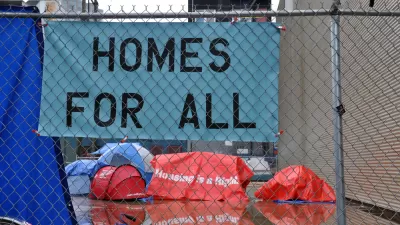Although the Section 8 Housing Choice Voucher is one of the federal government's most effective housing programs, its administration by local public housing agencies limit its ability to de-concentrate poverty. A new report proposes a solution.
As the Urban Institute's Margery Turner and Brookings' Bruce Katz argue in a new report [PDF], the most effective may to improve the balkanized Choice Voucher program is to consolidate its administration to better reflect how metropolitan areas actually work.
"Instead of having Section 8 run at the local level, they proposed setting up metro area-level housing authorities to run it," explains Dylan Matthews. "So instead of Alexandra, Fairfax, Arlington, Montgomery, P.G., and D.C. all having their own housing authorities administering Section 8, there'd be a D.C. metro authority. Once you got your voucher there, you could move to wherever in the area is most affordable, safe, and has the best schools for you and your family, without regard to municipal or state boundaries."
"The biggest effect of this is on program outcomes. Letting them make rational choices about how do you get closer to work, to quality schools," Katz tells Matthews. "I think more families would use them to go to neighborhoods that are safe and where things work already," Turner says. "We've got a growing body of evidence that escaping from distressed neighborhoods pays off for families in ways that pay off for all of us."
FULL STORY: Housing aid is maddeningly complex. It doesn’t have to be.

Planetizen Federal Action Tracker
A weekly monitor of how Trump’s orders and actions are impacting planners and planning in America.

Chicago’s Ghost Rails
Just beneath the surface of the modern city lie the remnants of its expansive early 20th-century streetcar system.

San Antonio and Austin are Fusing Into one Massive Megaregion
The region spanning the two central Texas cities is growing fast, posing challenges for local infrastructure and water supplies.

Since Zion's Shuttles Went Electric “The Smog is Gone”
Visitors to Zion National Park can enjoy the canyon via the nation’s first fully electric park shuttle system.

Trump Distributing DOT Safety Funds at 1/10 Rate of Biden
Funds for Safe Streets and other transportation safety and equity programs are being held up by administrative reviews and conflicts with the Trump administration’s priorities.

German Cities Subsidize Taxis for Women Amid Wave of Violence
Free or low-cost taxi rides can help women navigate cities more safely, but critics say the programs don't address the root causes of violence against women.
Urban Design for Planners 1: Software Tools
This six-course series explores essential urban design concepts using open source software and equips planners with the tools they need to participate fully in the urban design process.
Planning for Universal Design
Learn the tools for implementing Universal Design in planning regulations.
planning NEXT
Appalachian Highlands Housing Partners
Mpact (founded as Rail~Volution)
City of Camden Redevelopment Agency
City of Astoria
City of Portland
City of Laramie





























